Everything's worse but it was fair and moral (Part 2) (Patreon)
Downloads
Content
This post is a continuation from my last post called Reasoning from Utopia vs. from Reality where I discuss the channel Second Thought which describes itself as being "devoted to the education and analysis of current events from a Leftist perspective.” The channel has dedicated many videos to denouncing capitalism and promoting socialism. Surprisingly, one source found 2/3rds of young britons want to live under a socialist economic system and data from 2023 showed that 54% of Gen Z hold negative views of capitalism and 41% hold favorable views of socialism.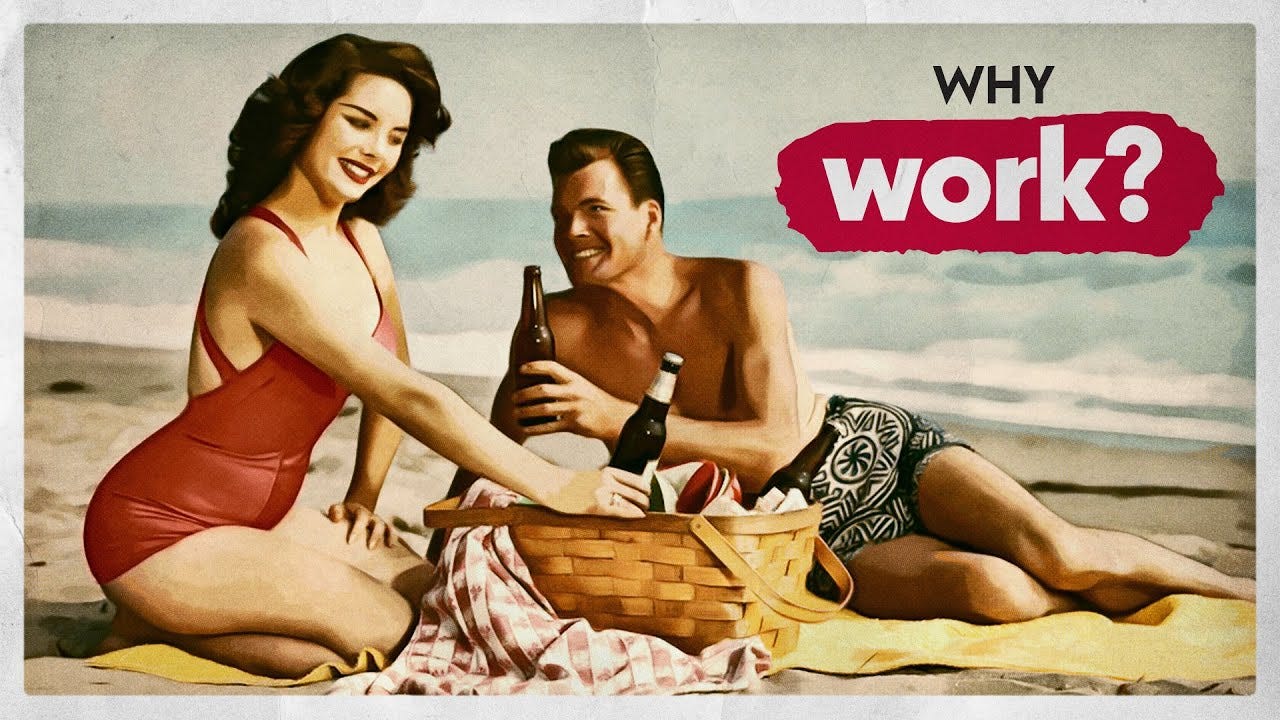 To be clear, Second Thought isn’t talking about something like socialism (as in capitalism with strong welfare policies), but actual socialism as in the government ‘seizing the means of production.’ For example in his video titled Why would anyone work under socialism?, he describes the capitalist workplace being bad because you have to do what your boss tells you and that “as a result of the common ownership of the means of production, this kind of thing would not be a feature of socialism.” He’s also said in his America's Looming Housing Crisis that if you have wealth at your disposal, you should “buy and distribute copies of socialist books,” because after all “we wouldn’t have had Marx without Engels.”If Second Thought was not advocating for ‘collective ownership over the means of production,’ but for something like a free-market, capitalist economy with more welfare providing more security for the citizens, I probably wouldn’t be writing this.
To be clear, Second Thought isn’t talking about something like socialism (as in capitalism with strong welfare policies), but actual socialism as in the government ‘seizing the means of production.’ For example in his video titled Why would anyone work under socialism?, he describes the capitalist workplace being bad because you have to do what your boss tells you and that “as a result of the common ownership of the means of production, this kind of thing would not be a feature of socialism.” He’s also said in his America's Looming Housing Crisis that if you have wealth at your disposal, you should “buy and distribute copies of socialist books,” because after all “we wouldn’t have had Marx without Engels.”If Second Thought was not advocating for ‘collective ownership over the means of production,’ but for something like a free-market, capitalist economy with more welfare providing more security for the citizens, I probably wouldn’t be writing this.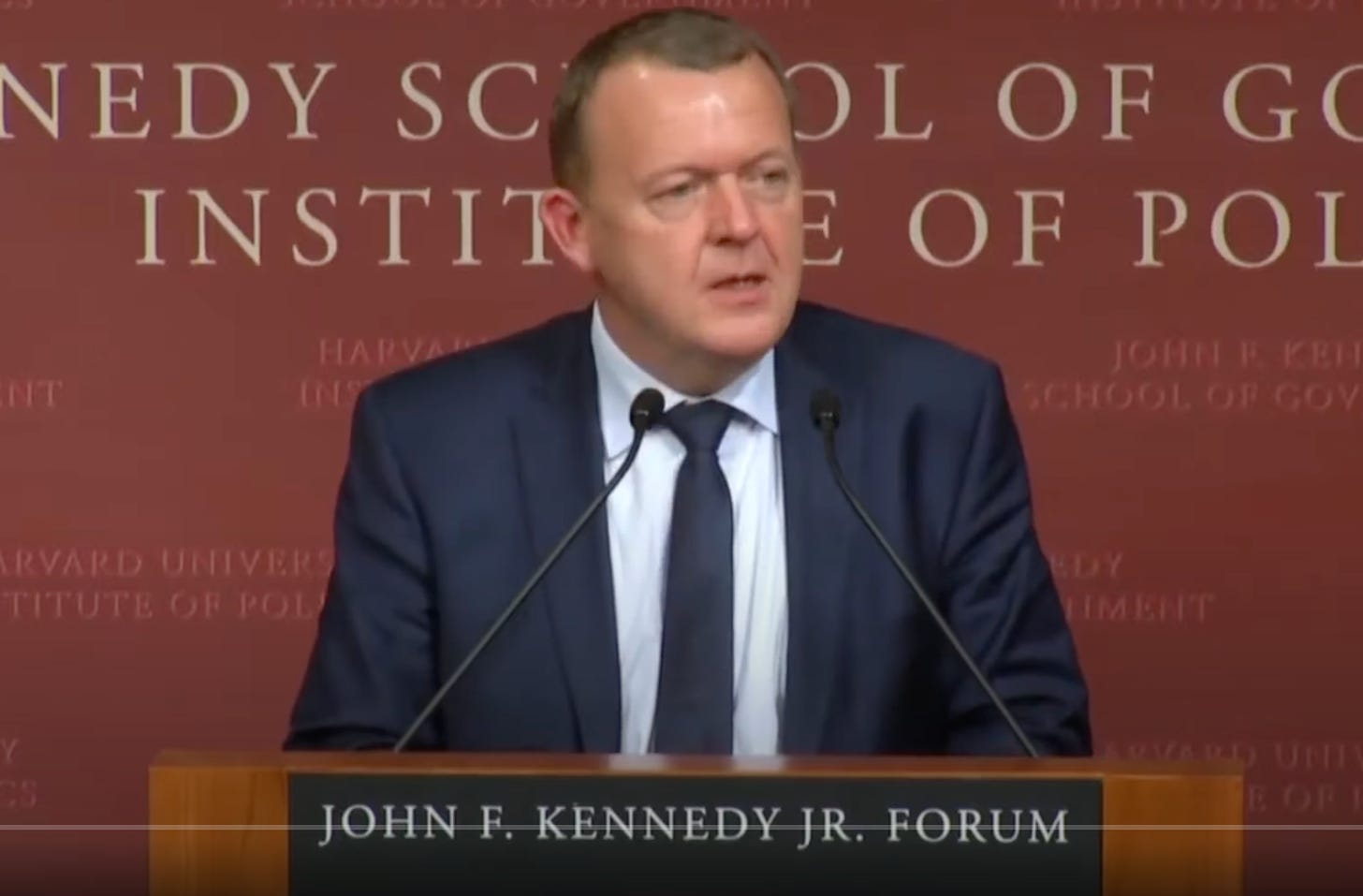 By the way, many people have said that we should be socialist ‘like Denmark.’ But Denmark isn’t socialist. The Denmark Prime Minister himself said specifically:
By the way, many people have said that we should be socialist ‘like Denmark.’ But Denmark isn’t socialist. The Denmark Prime Minister himself said specifically:
“I know that some people in the US associate the Nordic model with some sort of socialism. Therefore, I would like to make one thing clear. Denmark is far from a socialist planned economy, Denmark is a market economy. ...”As a Part 2 to my Reasoning from Utopia vs. from Reality post, in this article we’ll investigate one type of thinking used in Second Thought’s video, what Thomas Sowell calls “One-Stage Thinking.”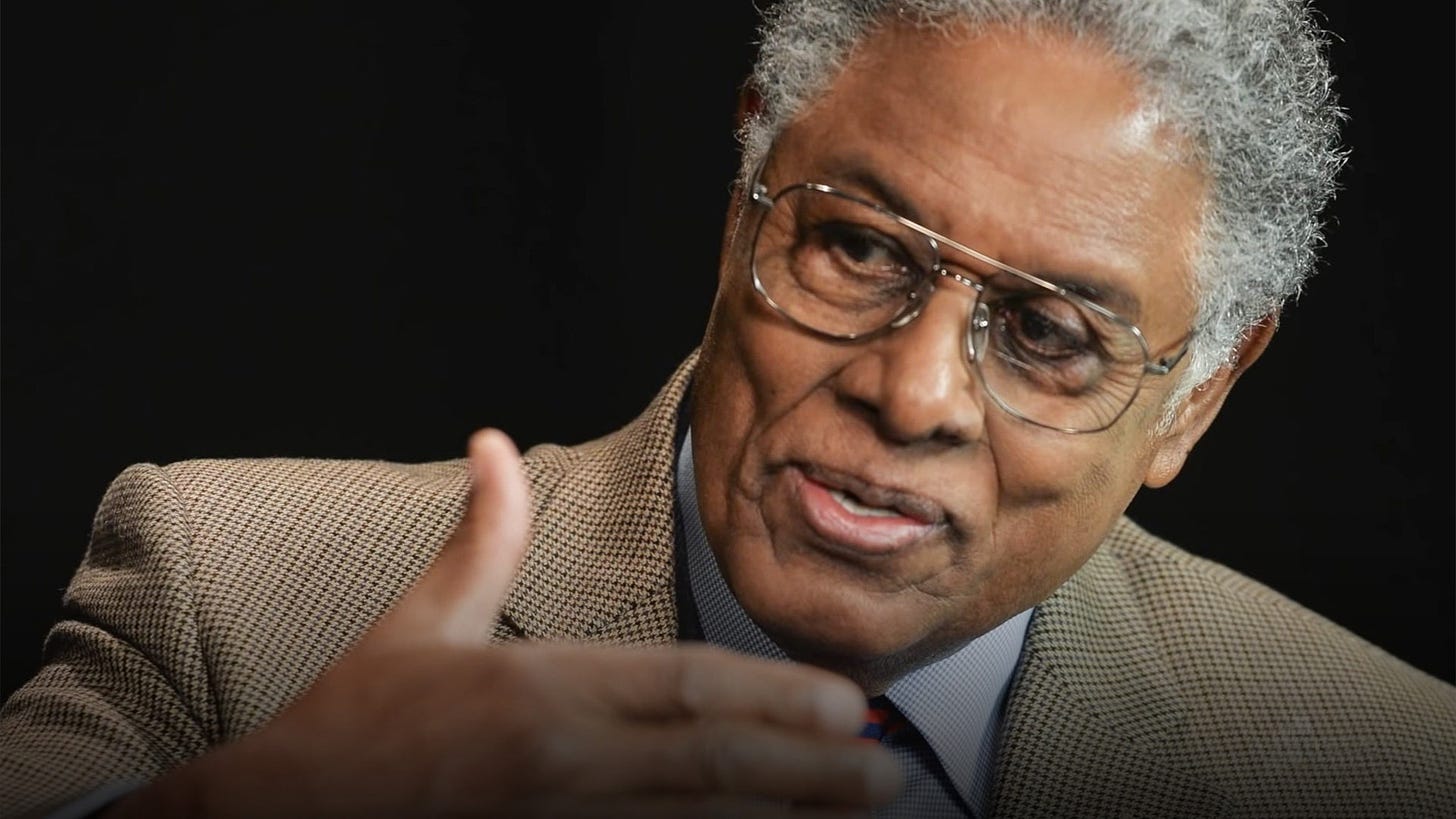 As described in this excerpt from his book, when Sowell was studying economics under professor Arthur Smithies at Harvard, he asked Sowell what policy he favored on a particular issue of the times. Sowell explained to Smithies what beneficial outcomes he could expect from his favorite policy. Smithies then asked him “And then what will happen?” Sowell then stopped for a moment to think and went on to explain the economic consequences he could expect from his policy. Smithies then asked him agina “And then what will happen?” Sowell started speculate more while coming to realize some of the negatives that his preferred policy would lead up to. Smithies persisted, asking him again: “And then what will happen?” Sowell finally realized that after enough dominoes had fallen, the policy he advocated for would eventually make people worse off than before it was enacted.So in this article, to get a grasp of the perils of and the cure for One-Stage thinking,1. First we’ll take a look at Second Thought’s video titled Why Would Anyone Work Under Socialism
As described in this excerpt from his book, when Sowell was studying economics under professor Arthur Smithies at Harvard, he asked Sowell what policy he favored on a particular issue of the times. Sowell explained to Smithies what beneficial outcomes he could expect from his favorite policy. Smithies then asked him “And then what will happen?” Sowell then stopped for a moment to think and went on to explain the economic consequences he could expect from his policy. Smithies then asked him agina “And then what will happen?” Sowell started speculate more while coming to realize some of the negatives that his preferred policy would lead up to. Smithies persisted, asking him again: “And then what will happen?” Sowell finally realized that after enough dominoes had fallen, the policy he advocated for would eventually make people worse off than before it was enacted.So in this article, to get a grasp of the perils of and the cure for One-Stage thinking,1. First we’ll take a look at Second Thought’s video titled Why Would Anyone Work Under Socialism
Second we’ll pick up where we left off last time and take a look at one of the solutions he proposed in his video How Capitalism causes Loneliness
We’ll do a deep dive into the Utopia First approach to the homeless crisis in California because it’s similar to Second Thought’s solution to the housing issuePOLLDo you know people who view socialism as favorable to capitalism?
Yes75%No25%28 VOTES · 6 DAYS REMAINING · SHOW OPTIONSLet me reiterate that I’m certainly not saying capitalist countries like the United States are perfect - plenty of unfair things can and do happen in a capitalist countries. They should be changed and improved. However not all bad things that happen in a capitalist country are inherent features of capitalism.
The Socialist Utopia where Humans stop behaving like HumansLet’s briefly take a look at another one of Second Thought’s videos Why Would Anyone Work Under Socialism? as it’s a demonstration of one-stage thinking. It wouldn’t get past many rounds of “and then what will happen?” He says that having to work to earn food or housing is a “brutal way to organize labor in a society.”After describing how in a socialist society, the government would take care of people’s food, shelter and so on, he asks “How do you get people to work if all their basic needs are met?” Then he essentially argues that people will still be motivated to work because it will be a lot more fun because you won’t have a boss and the workers will just ‘collectively’ call the shots.First I’m wondering how exactly this works when people drastically differ in areas of expertise, experience and competence? There’s a reason factories in the states require factory managers to have 5+ years experience in engineering and operations management and pay them six-figures rather than having unskilled workers just … come to an agreement on how the factory should be run.
He says that having to work to earn food or housing is a “brutal way to organize labor in a society.”After describing how in a socialist society, the government would take care of people’s food, shelter and so on, he asks “How do you get people to work if all their basic needs are met?” Then he essentially argues that people will still be motivated to work because it will be a lot more fun because you won’t have a boss and the workers will just ‘collectively’ call the shots.First I’m wondering how exactly this works when people drastically differ in areas of expertise, experience and competence? There’s a reason factories in the states require factory managers to have 5+ years experience in engineering and operations management and pay them six-figures rather than having unskilled workers just … come to an agreement on how the factory should be run.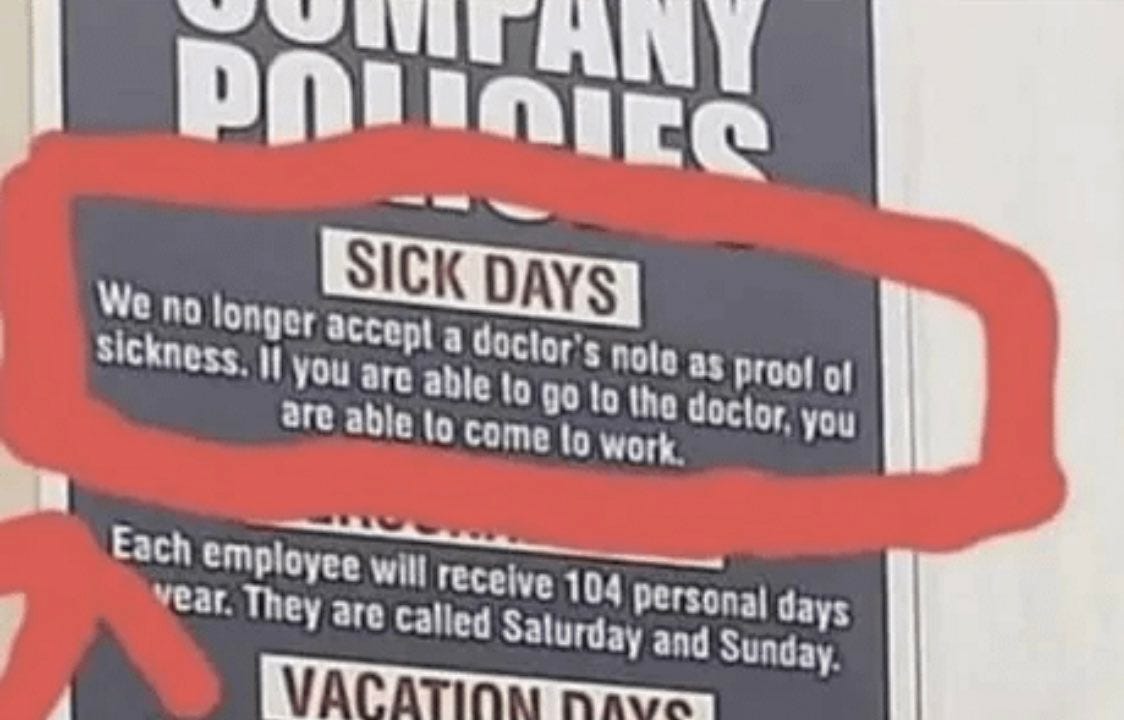 In any case, there are of course tons of terrible employers in the states making peoples jobs super crappy … but is whoever has the last say on which line cook will do what at the socialist government approved Burger King going to be any less of a jerk than an actual boss in a capitalist restaurant?
In any case, there are of course tons of terrible employers in the states making peoples jobs super crappy … but is whoever has the last say on which line cook will do what at the socialist government approved Burger King going to be any less of a jerk than an actual boss in a capitalist restaurant?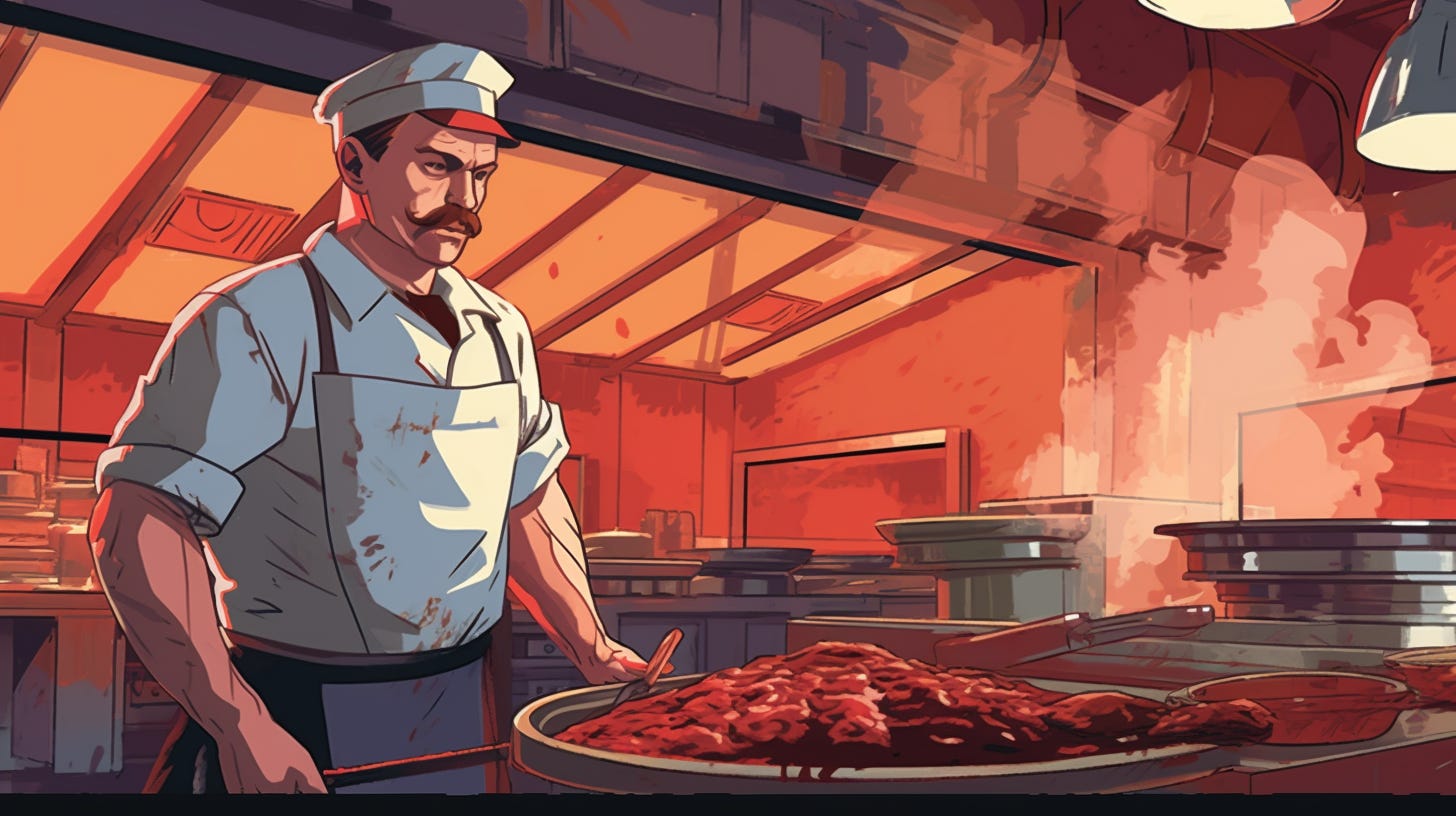 Anyways, Second Thought argues that once people move out of capitalist workplaces that treat you like “an interchangeable cog” and into socialist workplaces that “takes up a lot less of your time and treats you like a human being with agency,” we will be encouraged to work because we will just enjoy it like we enjoy cooking a meal for ourselves. Though apparently won’t be encouraged to work as much as in capitalism because as he says, work will take up a lot less of our time…Second thought says:
Anyways, Second Thought argues that once people move out of capitalist workplaces that treat you like “an interchangeable cog” and into socialist workplaces that “takes up a lot less of your time and treats you like a human being with agency,” we will be encouraged to work because we will just enjoy it like we enjoy cooking a meal for ourselves. Though apparently won’t be encouraged to work as much as in capitalism because as he says, work will take up a lot less of our time…Second thought says:
“If we can make the unpleasant things we do pleasant, we will do them because that’s how we treat everything else. That’s why we cook for ourselves, make our beds and clean the counters, it’s why 1/4 Americans volunteers. We make necessary things pleasant. Doing work with a clear result that has a demonstrable impact where you can see progress and where you work with other people, makes people happy. Work that takes this into account, not just the bottom line, is work that is attractive. We can do that for the whole economy once we stop prioritizing profits.”So… Somehow Janitors, Traffic Wardens, Portable Toilet Cleaners, Brick Layers, Roadkill collectors, Sewer Cleaners, Crime Scene Cleaners, Pest Control Officers, Dead Fish harvesters will all be motivated to do their (usually) unpleasant jobs despite already having food, housing and other basic needs already met. They won’t be resentful of the people doing the much cushier jobs.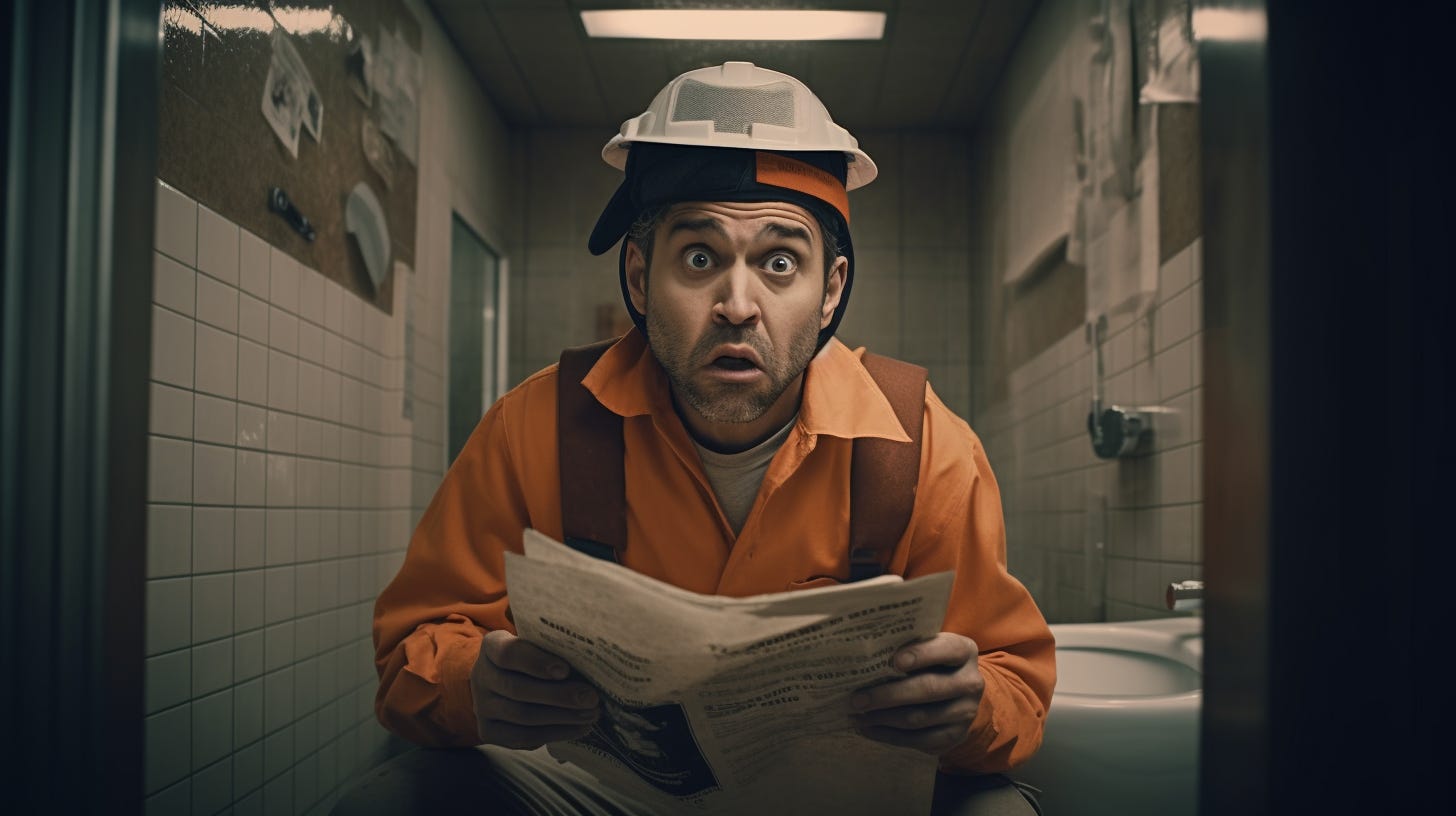 Are Wind Turbine Technicians still going to be motivated to risk their lives to do their duty despite not really… having to? Who’s going to volunteer to do the jobs listed as most dangerous by OSHA? Jobs like Roofers, Logging Workers, Construction Workers, Fishing and Hunting Workers, Structural Iron and Steel Workers, Underground Mining Machine Operators, and Refuse Waste and Recyclable Material Collectors? Are people going to enjoy those jobs just because they can see the impact that their work is making?So keep this logic in mind as we go forward because these flawed assumptions about human behavior are illustrative of why Second Thought’s video on loneliness doesn’t pan out.At 10:51 in the video we discussed last time How Capitalism causes Loneliness, Second Thought suggests that one of the solutions to capitalism-caused-loneliness is to guarantee housing to alleviate people’s mental stressors and we can do this by redistributing vacant houses.Second thought says:
Are Wind Turbine Technicians still going to be motivated to risk their lives to do their duty despite not really… having to? Who’s going to volunteer to do the jobs listed as most dangerous by OSHA? Jobs like Roofers, Logging Workers, Construction Workers, Fishing and Hunting Workers, Structural Iron and Steel Workers, Underground Mining Machine Operators, and Refuse Waste and Recyclable Material Collectors? Are people going to enjoy those jobs just because they can see the impact that their work is making?So keep this logic in mind as we go forward because these flawed assumptions about human behavior are illustrative of why Second Thought’s video on loneliness doesn’t pan out.At 10:51 in the video we discussed last time How Capitalism causes Loneliness, Second Thought suggests that one of the solutions to capitalism-caused-loneliness is to guarantee housing to alleviate people’s mental stressors and we can do this by redistributing vacant houses.Second thought says:
How many sources of anxiety, stress, suicidality, depression, anger, and misery do you think could be avoided if we used all the empty houses at our disposal to guarantee people a home instead of sitting on them until they turned a profit?This sounds nice, but as Thomas Sowell has said: “there are no solutions, only tradeoffs.” The problem with the ‘whatever sounds the kindest is the best course of action because it is most fair and moral’ approach is that it crumbles under questions about the specifics and questions like “and then what will happen?”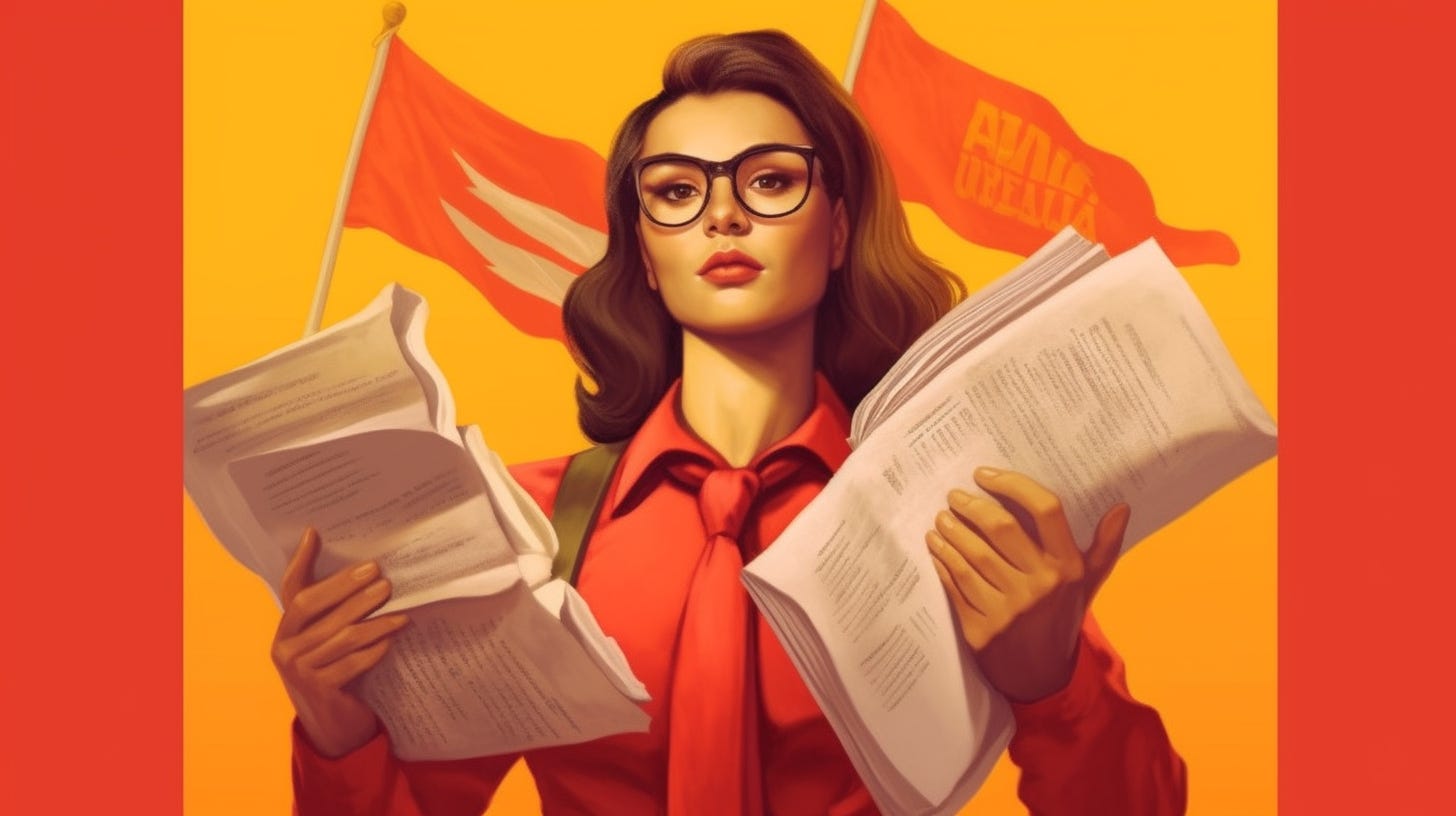 How Socialism will solve loneliness: Guaranteed housing?To address what Second Thought said and this topic of income inequality and its connection to the housing crisis means addressing:1. Whether giving out vacant houses would solve the homeless situation2. Whether guaranteeing houses will solve the mental stress non-homeless people bear in trying to afford their housing3. The root problem of housingFor now we’ll get into the weeds of the first point because the way to combat simplistic ideas like socialism or ‘just give people those empty houses’ that sound nice is to get into the specifics. While they sound really fair and moral at first glance, they don't make sense when you start asking questions.
How Socialism will solve loneliness: Guaranteed housing?To address what Second Thought said and this topic of income inequality and its connection to the housing crisis means addressing:1. Whether giving out vacant houses would solve the homeless situation2. Whether guaranteeing houses will solve the mental stress non-homeless people bear in trying to afford their housing3. The root problem of housingFor now we’ll get into the weeds of the first point because the way to combat simplistic ideas like socialism or ‘just give people those empty houses’ that sound nice is to get into the specifics. While they sound really fair and moral at first glance, they don't make sense when you start asking questions.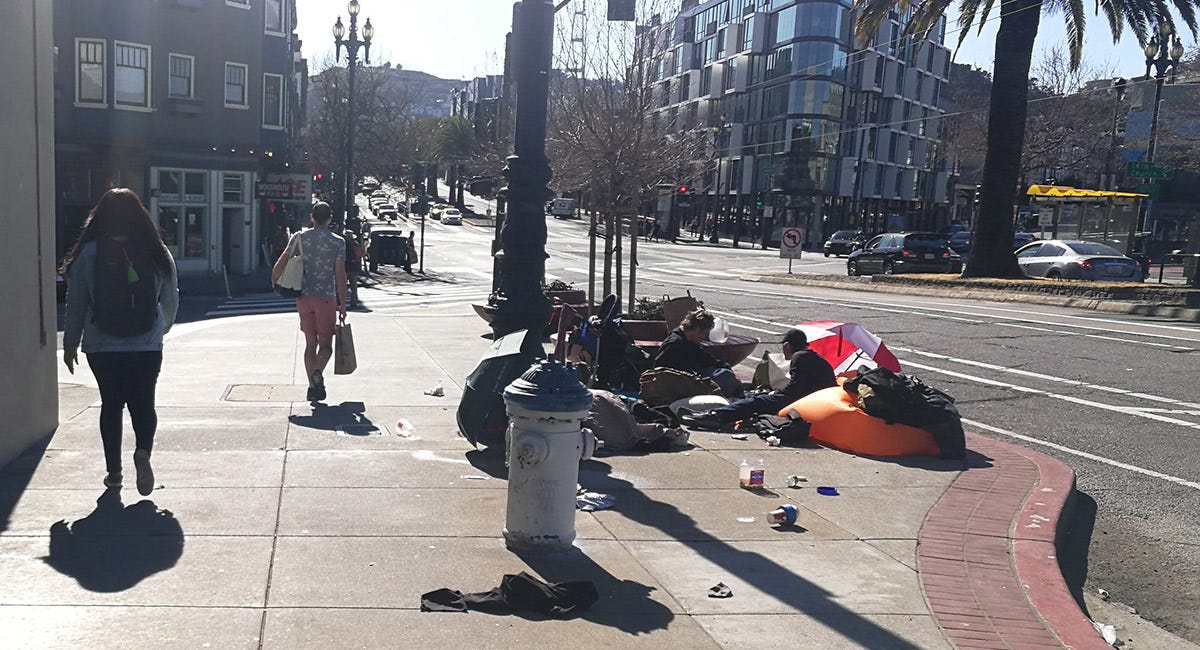 Can’t we Robin Hood all those empty houses?I’m not here to argue what the solution is to the homeless crisis, but I’m going to offer reasons why (a) Second Thought’s proposed solution of ‘give the homes of the exploiters to the exploited’ is far too simplistic and why (b) the problem isn’t necessarily capitalism itself.・In 2022, 582,462 people were homeless in the United States.(S)・Newsweek puts the number of empty homes in the United States at 16 million.
Can’t we Robin Hood all those empty houses?I’m not here to argue what the solution is to the homeless crisis, but I’m going to offer reasons why (a) Second Thought’s proposed solution of ‘give the homes of the exploiters to the exploited’ is far too simplistic and why (b) the problem isn’t necessarily capitalism itself.・In 2022, 582,462 people were homeless in the United States.(S)・Newsweek puts the number of empty homes in the United States at 16 million.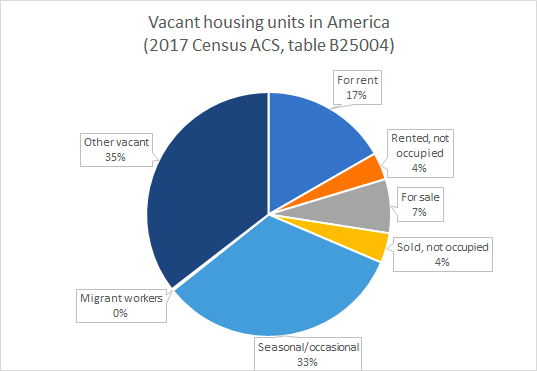 ・Even when you account for the fact that about a third of these vacant homes are run-down and/or prohibitively expensive to make habitable and to upkeep, and that another third of these are just simply temporarily vacant while switching between renters, and that another chunk of the vacant houses are not in areas not practical for the homeless to live in, … theoretically there should be enough houses left over that you could steal 582,462 of them from their owners and give them to people in need.This approach of Robin Hooding these vacant houses sounds like the Housing First approach to solving homelessness. The proponents of Housing First describe it as a
・Even when you account for the fact that about a third of these vacant homes are run-down and/or prohibitively expensive to make habitable and to upkeep, and that another third of these are just simply temporarily vacant while switching between renters, and that another chunk of the vacant houses are not in areas not practical for the homeless to live in, … theoretically there should be enough houses left over that you could steal 582,462 of them from their owners and give them to people in need.This approach of Robin Hooding these vacant houses sounds like the Housing First approach to solving homelessness. The proponents of Housing First describe it as a
homeless assistance approach that prioritizes providing permanent housing to people experiencing homelessness, thus ending their homelessness and serving as a platform from which they can pursue personal goals and improve their quality of life.But does this solve the root issues of homelessness?
Progressive Strategies Rewarding Dependency: ‘Loving to Death’Consider this viral tweet where a homeless Portland woman describes being homeless as “a piece of cake.”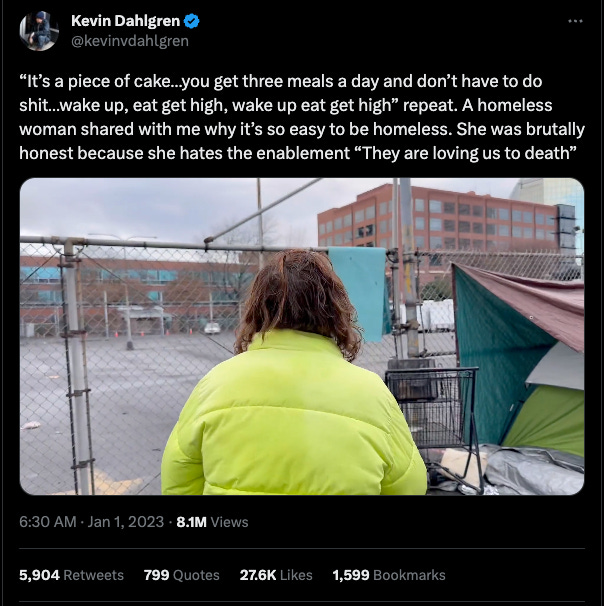
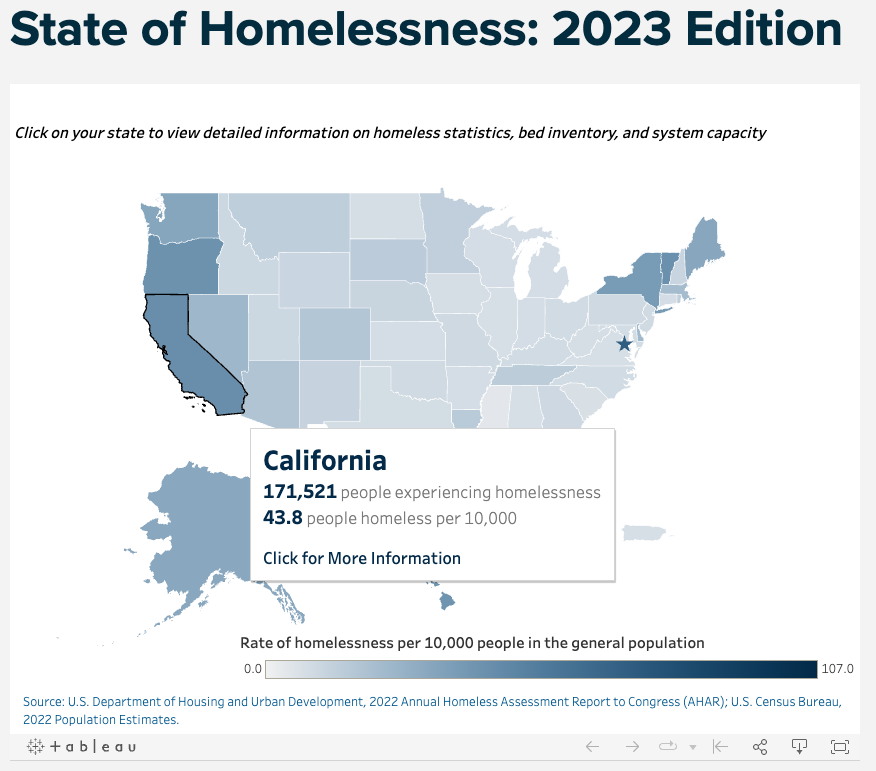 Michael Shellenberger, author of San Fransicko says that the homeless problem in California, the state with the most homeless per 10,000 people, is mischaracterized as a problem of too high rent. Rather, the root problem is drug abuse and untreated mental illness.
Michael Shellenberger, author of San Fransicko says that the homeless problem in California, the state with the most homeless per 10,000 people, is mischaracterized as a problem of too high rent. Rather, the root problem is drug abuse and untreated mental illness. Shellenberger says
Shellenberger says
“I think my fellow progressives did a disservice by suggesting that this is just about high rents. If you can’t afford the rent, the last place you’re going to go live is on the most dangerous and dirty streets in America. You’re going to move out of state, you’re going to move in with friends. …addicts looking to maintain their addiction end up going to the most liberal places and it ends up concentrating the problem and it also prevents us from being able to solve the problem in the cheapest way possible.”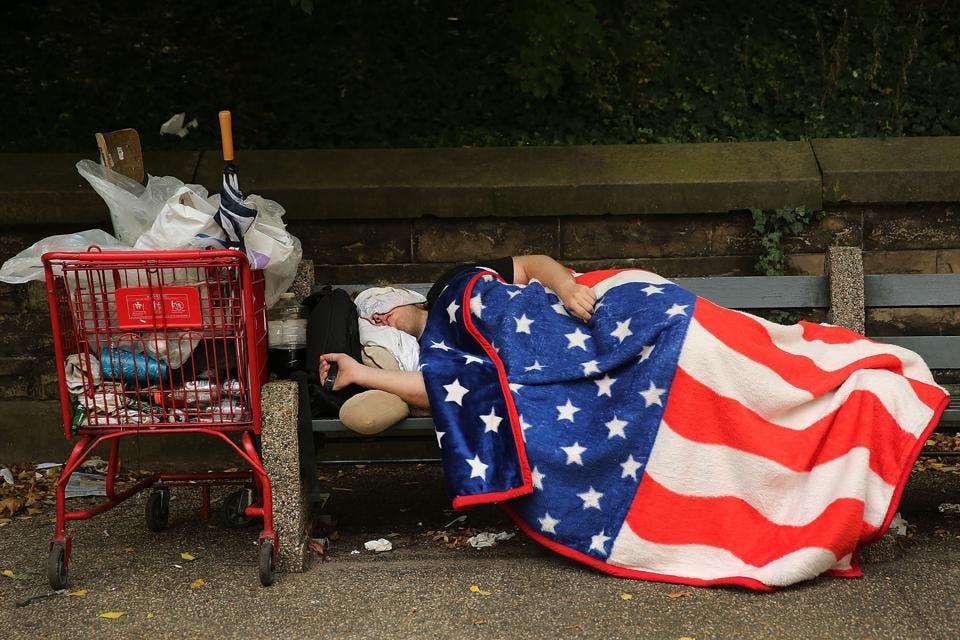 Dr. Stephen Eide, author of Homelessness in America: The History and Tragedy of an Intractable Social Problem wrote a thorough report in 2020 titled Housing First and Homelessness: The Rhetoric and the Reality. He writes in his report that:
Dr. Stephen Eide, author of Homelessness in America: The History and Tragedy of an Intractable Social Problem wrote a thorough report in 2020 titled Housing First and Homelessness: The Rhetoric and the Reality. He writes in his report that:
“Housing First has two chief tenets: (1) the most effective solution to homelessness is permanent housing; and (2) all housing for the homeless should be provided immediately, without any preconditions, such as sobriety requirements.”Michael Shellenberger elaborates on that second part, saying:
“I think people don’t understand that the so called housing first policy has backfired. Housing First is this really utopian idea that you can provide an apartment for anybody who says they want one and says that they’re homeless in San Francisco. The right way to do it is to provide people with shelter - basic shelter, clean and safe shelter and then make housing a reward for good behavior whether that’s abstinence and sobriety or following through on your psychiatric care. San Franciscans have not done that, they actually sought to remove all consequences of dangerous and illegal behavior from people that they’ve determined to be victims.”He expands on this point, commenting that this idea that not expecting anything of the homeless while giving them free housing is an effect of the victim ideology growing in progressives.He says:
“A lot of it is also victim ideology … which is like they’re victims of trauma and racism and poverty and whatever and addiction and mental illness, so that means you should give them things like their own apartment and offer them help, but don’t require [that they get this help], don’t mandate it because that would be an extension of the victimization … and that’s where everything goes wrong.”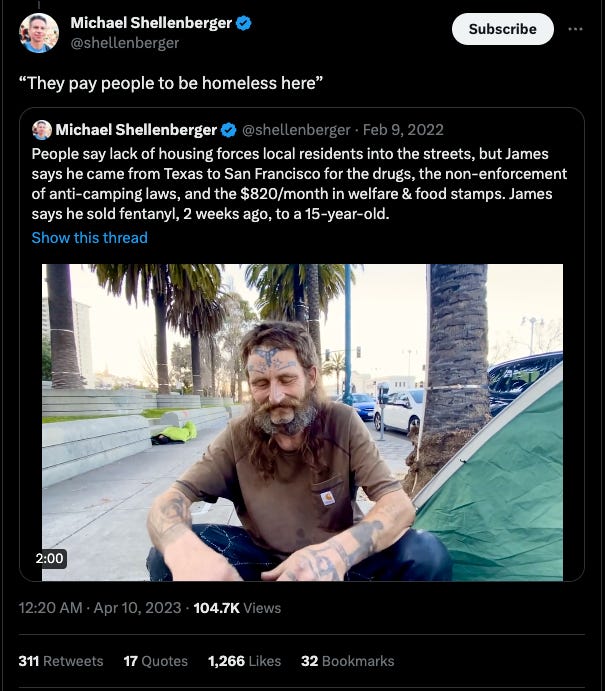 Obviously it’s all about how you incentivize people’s behavior. If you don’t punish camping or open drug usage and pay people $820/month to be homeless, you just might get an influx of drug addicted people coming to your city with not much motivation to stop being homeless.Now, don’t get me wrong that Michael Shellenberger is saying the homeless should be left to fend for themselves without too much help from the government because any sort of help will make them “dependent.” Not at all. Shellenberger says we should want that everyone has “a safe and clean place to sleep.” The most dangerous place to be is the streets. However, he also says this provided shelter “should not be so nice that it attracts people to want to stay there.”As discussed earlier he accounts for basic human motivations and says housing should be something given as a reward for good behavior. He’s written an article titled Three Times More Homeless Die Under "Housing First" than "Shelter First" Policies, Data Show where he criticizes Gavin Newsom’s policies that have left homeless people on the dangerous streets waiting for their turn at very expensive free housing while not access to shelters because money has been diverted away from them for the permanent housing.Again we have to analyze how people are incentivized. Data from 2015 shows that covering the housing needs of the homeless for free no-strings-attached didn’t encourage them go work … it did the opposite.The 2015 Family Options Study found evidence that housing subsidies, "instead of granting recipients the freedom to focus more on employment and less on their housing instability challenges, actually lead to diminished work effort. In sum, housing subsidies increased rates of housing stability ... but not self-sufficiency.”(S)
Obviously it’s all about how you incentivize people’s behavior. If you don’t punish camping or open drug usage and pay people $820/month to be homeless, you just might get an influx of drug addicted people coming to your city with not much motivation to stop being homeless.Now, don’t get me wrong that Michael Shellenberger is saying the homeless should be left to fend for themselves without too much help from the government because any sort of help will make them “dependent.” Not at all. Shellenberger says we should want that everyone has “a safe and clean place to sleep.” The most dangerous place to be is the streets. However, he also says this provided shelter “should not be so nice that it attracts people to want to stay there.”As discussed earlier he accounts for basic human motivations and says housing should be something given as a reward for good behavior. He’s written an article titled Three Times More Homeless Die Under "Housing First" than "Shelter First" Policies, Data Show where he criticizes Gavin Newsom’s policies that have left homeless people on the dangerous streets waiting for their turn at very expensive free housing while not access to shelters because money has been diverted away from them for the permanent housing.Again we have to analyze how people are incentivized. Data from 2015 shows that covering the housing needs of the homeless for free no-strings-attached didn’t encourage them go work … it did the opposite.The 2015 Family Options Study found evidence that housing subsidies, "instead of granting recipients the freedom to focus more on employment and less on their housing instability challenges, actually lead to diminished work effort. In sum, housing subsidies increased rates of housing stability ... but not self-sufficiency.”(S) Good Intentions vs. RealityOne of the big arguments for Housing First or “PSH” (Permanent Supportive Housing) is that it will act as a platform for people to improve other areas of their life. Once they have their housing settled, they can get their act together.But as suggested already, the good intention does not lead to a good reality.Dr. Judge Glock writes in Housing First is a Failure:
Good Intentions vs. RealityOne of the big arguments for Housing First or “PSH” (Permanent Supportive Housing) is that it will act as a platform for people to improve other areas of their life. Once they have their housing settled, they can get their act together.But as suggested already, the good intention does not lead to a good reality.Dr. Judge Glock writes in Housing First is a Failure:
"We’ve built over 200,000 new PSH units for the homeless, as they’re known, and, since 2013, the federal government has mandated the Housing First strategy nationwide. Yet since that nationwide mandate has gone into effect, we’ve seen street homelessness increase by almost a fourth.”California made Housing First a requirement for state-funded homelessness programs in 2016. Yet, so many communities that participated in the campaign to end homelessness, such as Los Angeles and San Francisco, are now dealing with unprecedented homeless crises.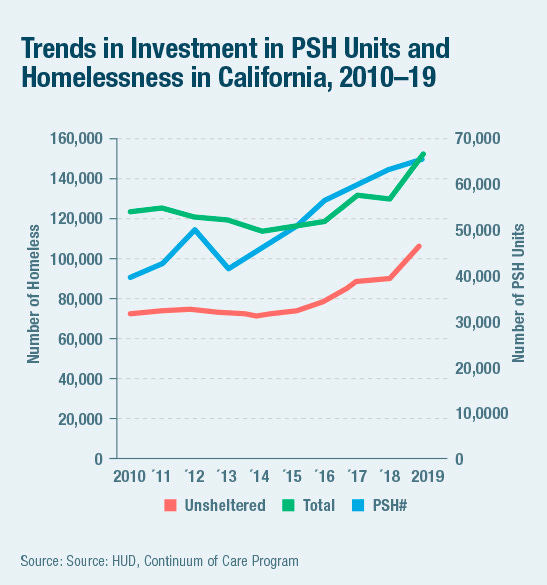 Since 2010, California has added more than 25,000 PSH (permanent supportive housing) units, an increase of about two-thirds yet the state’s unsheltered homeless population increased by half.Michael Shellenberger, states that despite homelessness declining by 18% in the rest of the US, it has increased by 31% in California. Again, part of the problem is that “Gavin Newsom keeps making homelessness worse by offering free housing to drug addicts and refusing to crack down on open drug scenes”
Since 2010, California has added more than 25,000 PSH (permanent supportive housing) units, an increase of about two-thirds yet the state’s unsheltered homeless population increased by half.Michael Shellenberger, states that despite homelessness declining by 18% in the rest of the US, it has increased by 31% in California. Again, part of the problem is that “Gavin Newsom keeps making homelessness worse by offering free housing to drug addicts and refusing to crack down on open drug scenes”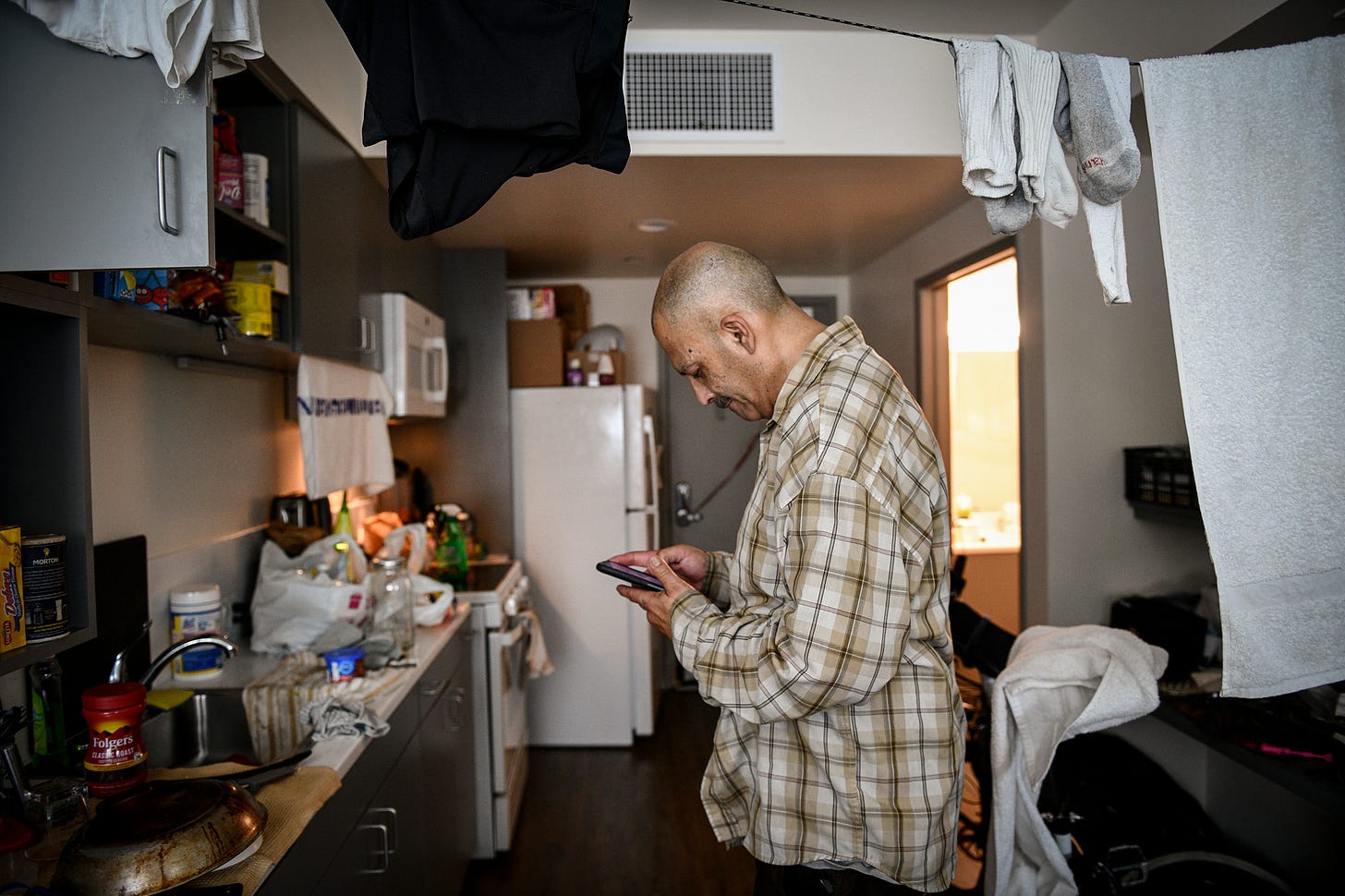 But wouldn’t having the comfort of a house give homeless people enough mental leeway to work on getting clean?Stephen Eide points out that:
But wouldn’t having the comfort of a house give homeless people enough mental leeway to work on getting clean?Stephen Eide points out that:
“Housing is not the same as treatment. Housing First’s record at addressing behavioral health disorders, such as untreated serious mental illness and drug addiction, is far weaker than its record at promoting residential stability.”Dr. Judge Glock also wrote
“…studies have now shown that simply providing people subsidized housing does not reduce drug use, and often encourages it, which makes sense because there is no mandated treatment in PSH (Permanent Supportive Housing) and the free unit provides people with more money to pursue their habits.[10] In one randomized-control trial in Ottawa, the homeless put in PSH had higher rates of substance use, mental illness, and death than people simply left on the streets.[11] … More concerning, a survey of all PSH studies from the National Academies of Science found “that there is no substantial published evidence as yet to demonstrate that PSH improves health outcomes.”[13] Thus, PSH, on its own, is not an effective or cost-efficient tactic for improving the lives of the chronically homeless.[14]”It’s not a hard to grasp concept that if someone lost their livelihood and apartment to addiction and then lived with family until they were kicked out for stealing stuff to fund their addiction and then became homeless … then they might just use the financial leeway that the PSH affords on continuing their habit.The State of Homelessness in America, reporting on the work of Kertesz and Johnson says: “For outcomes such as impacts on substance abuse and mental illness, Housing First in general performs no better than other approaches.”Michael Shellenberger points out that
“…progressives misunderstand and misdescribe drug addiction as just “poor people.” They look poor and they are poor but that's a consequence of suffering the mental illness that we call addiction - not simply having been poor. And to some extent it's San Francisco's great wealth that's created the crisis on the streets. By which I mean San Francisco gives out cash, it gives out free housing, it gives many other amenities to people who demand them often in support of their addiction and that's attracted people to San Francisco. It's created these open drug scenes, where as in other cities that haven’t been so generous, we haven’t seen open drug scenes and open-air dealing.”
Reasoning from Utopia vs. RealityAll of this ties into the Utopia First (as opposed to First Principles) type thinking I described in my first article.People aren’t thinking whether Socialism actually works, they think that it is more ‘fair” so it is the most moral. Similarly, the thinking here seems to be that it’s not fair that there are all these homes that rich people have that aren’t using, so it’s most moral to just take those houses and give them to the people who need them the most.But like most of these Utopia First types of plans that gain support because they sound great, they quickly crumble when you get into the specifics or when you simply ask “what will happen after you implement that?”Second Thought’s videos seem to follow a 3 step resentment stoking pattern:(1) Describing things about the average person’s (viewer’s) life they may be discontent with(2) Point out the way the “capitalists” lives are better(3) Say in so many words ‘therefore, socialism is better’ (a non-sequitur)After resentment towards the better-off is sufficiently stoked, then he is poised to offer up a very vague simplistic solution like “just give the people who need a house a vacant house,” which sounds so great and fair that it doesn’t leave people worrying about the specifics.If the fact that socialism has utterly failed time and time again wasn’t reason enough … we should avoid at all costs ideas like Marxism or Socialism that breed resentment in people. Second Thought pushes heavily this idea that you are either in the “exploited” (proletariat) or the “exploiter” (bourgeois) class. The idea is the reason your life isn’t how you want it to be is because someone else got their life to be how they wanted it to be. Second Thought thinks has to be the case because as we discussed last time, he incorrectly sees the employer employee relationship as a “zero-sum” game - for someone to win, someone else has to lose. The rich get rich because they take from the poor. The reality is the rich get rich as the poor get rich, as evidenced by the fact that the Upper class AND Middle & Low class incomes have risen since 1970.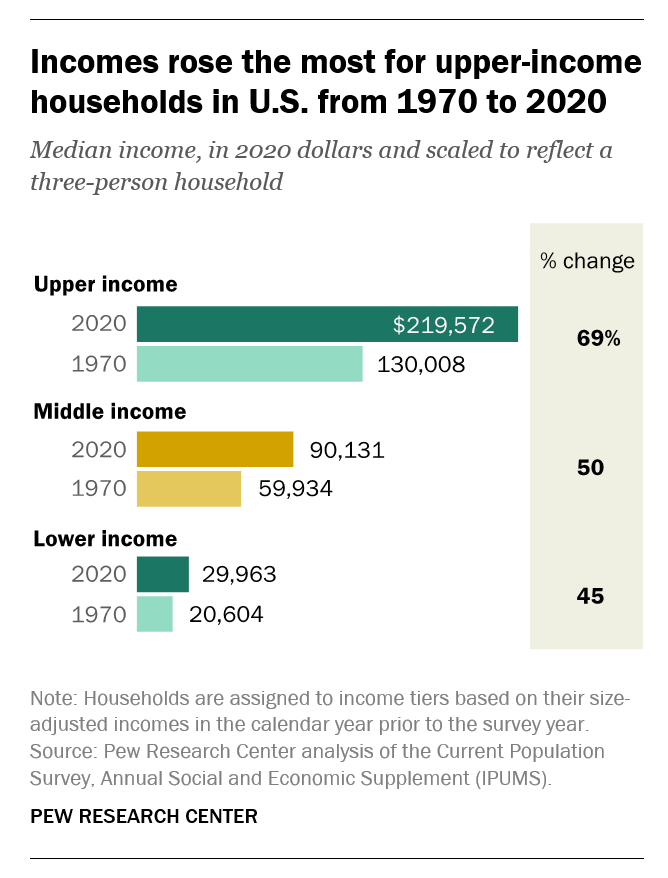 Share
Share
